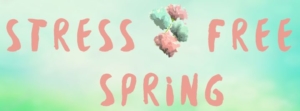Stress

Stress
stres/
noun
1.
pressure or tension exerted on a material object.
“the distribution of stress is uniform across the bar”
| synonyms: | pressure, tension, strain
“the stress is uniform across the bar” |
2.
a state of mental or emotional strain or tension resulting from adverse or very demanding circumstances.
“he’s obviously under a lot of stress“
| synonyms: | strain, pressure, (nervous) tension, worry, anxiety, trouble, difficulty;
Informal hassle “he’s under a lot of stress” |
- the deformation caused in a body by such a force: a physical, chemical, or emotional factor that causes bodily or mental tension and may be a factor in disease causation.
There are many definitions of stress in different fields of human studies and sciences. In language studies it can mean the way you “stress” the syllable, in physics it can mean a force exerted on an object, and in psychology it can mean another matter. In this blog we will focus on the third definition which was inspired by Hans Selye MD, with one missing detail, thermal forces.
Hans Selye MD is the pioneer in our understanding of the biological stress of of are bodies. He published a book called “The Stress of Life”. Dr. Robert Sapolsky’s book, “Why Zebras Don’t Get Ulcers”, is another great book to read to understanding, biological stress, how it affects you, and what you can do to adapt to it.
Hans Selye defined stress in the most general way as,’ “the non-specific response of the body to any demand for change”.. He divided the adaption of the body into two categories- eustress (good stress) and distress (bad stress). Eustress can be defined as exercising. Your body must respond to the demands of the exercise then adapt. This stress will make the body better adapted to similar stress, ie. increased strength and stamina-that is if it has sufficient rest. Distress is when your body cannot fully recover and loses its ability to cope (adaptation turns into compensation). This is grief, long stretches of stress from work, school, environment, friends, family and any other seemingly “hopelessly endless” conditions. Long term pain, lack of sleep, physical exertion, climate etc., can be thrown into the distress category as well.
Dr. Sleye divided the causes of distress into four sources. He defined them as: physical, mental/emotional, chemical and thermal. In order for him to get the basis of this understanding he had, unfortunately, tortured rats with pain, fear, chemical exposures and extreme temperatures. How he defined stress was to measure the output of the stress hormone cortisol. Cortisol is released from the adrenal glands, which are more widely known as the stress glands. These glands lie on top of the kidneys. He found if he physically stressed a rat with pain, or he exposed them to extreme temperatures they would have an increased in cortisol, in their bodies, at the same amounts. This was consistent with emotional stress and chemical stress, such as exposure to predators and chemical burns and starvation. In sum, the body does not make a distinction is the stress in “real” or perceived; it will release stress hormones to help the body prepare.
Then, because he was thorough and possibly he was Austrian, he continued to torture the rats in the most varying ways so he could see how the body held up. When stress is consistent the body will eventually switch to automatically putting out cortisol which Dr. Selye called the “Resistant Stage”. This is the stage when one has a hard time winding down from the day to day. Coffee, alcohol, sugar and cravings become more common in this stage. This is where sleep problems start, allergies, asthma, arthritis, acid reflux, recurrent infections, skin issues, irritable bowel syndrome, as well as anxiety and depression have their start here. From a cultural perspective, this is the time when we start college, military, families, and our careers-the start of our ”adulting”. We are continuously doing something: jumping through hoops, deadlines, finals, raising young children, or any situation where you have to complete an activity before you can rest (do nothing). I assure you, that doing nothing is a possibility, an art form, and the greatest arena for greatness. When the Resistant Stage continues without any rest it will move into the “Exhaustion Stage”. This is where the body breaks down (loses its ability to adapt). Selye found that the body will increase the size of the adrenal glands (swelling), develop ulcers in the stomach and small intestine (digestion problems) and the lymphatic system (immune system and cleansing system) will shrink. This is the stage where various disease processes can gain a foothold and health can be lost.
As a chiropractor I hear about , and treat stress all day. What I have observed is that people know that mental and emotional stress can cause their physical symptoms, which is great to know. . However, most of my patients do not realize that another cause of stress is what they eat, drink and think. We, me included, will blame our ills and injuries on the last thing we were doing or did. However, the stress load started before the crash. The key, at this time and place, is to know where the trail started and to know what stress to the body looks like before you feel it in your body and mind.
To get down to the point, I get to see the work of Selye in my patients lives- not in a lab but in my practice. If you have not gathered by now, a majority of us are in the Resistant Phase in our adrenal health. Therefore, you must consider yourself as an elite athlete, in the middle of a marathon that may not end. If you can allow that last thought play in your mind, then the next question would be, “what do I do now to avoid the Exhaustion Stage?”. If you are one that wants to perform better in this stage, the following will help.
Well, here you go:
- Blood sugar regulation- This is number one- all day! We are really challenging our blood sugar regulation at this time in the US. The average US citizen eats over 150 lbs a year. In the late 1800’s it was 10lbs. In the history of mankind and prehistory this is a new and challenge to our metabolism, yet it is so subtle to our way of life and everyday. You must eat breakfast-the best way to help the body regulate blood sugar is a breakfast of natural protein and vegetables only: No juice, protein powders or starches. If you are a vegetarian-then have no fruit in the morning. Continue to have each meal consist of natural protein and vegetables only. Work on getting sugar out of your diet.
- Food allergy/intolerance- Look into food allergies or intolerance. . The foods that we eat can cause stress to our bodies. Currently, the most common food allergies are: wheat, dairy, soy, can corn. I have seen high numbers of people with the blood spot tests show eggs as well. Blood draw tests, and skin prick tests may not be sensitive enough to find these problems if they exist. I have blood spot tests in my clinic and they are also provided by Naturopaths, other Chiropractors , and some Medical Doctors (Functional Medical Doctors).
- Rest- We need sleep! Get good rest by sleeping at night. If you cannot sleep-find out how you can. This is hugely important. If you wake and cannot fall back to sleep- have a salivary adrenal panel or a dry urine test run to find out about your cortisol levels and rhythm. This can be a adrenal problem that can be found with these tests. Take a nap any time you can!
There is much more, of course, one can do. This is a good start and it is pretty straight forward. I wanted to write it this way. I highly recommend that you take your health in your hands. You must become the constant gardener and learn at your pace, the best way you can. The best guide is Mother Nature herself. The best way you can be guided by her is what you eat. Eat real food such as meats, vegetables and fruit as close to their natural form as possible.




